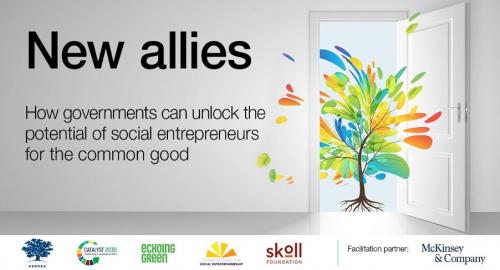
Executive Summary
https://catalyst2030.net/resources/new-allies-report/
With multiple compounding crises to navigate simultaneously,
governments across the world are facing the pressure to
become faster and better at achieving societal goals.
Delivering on goals such as access to quality healthcare and education,
environmental sustainability or a balanced recovery from the pandemic will require
changes to existing societal systems. This is because the underlying challenges are
systemic in nature – and the required changes can be beneficial, not just from a
societal but also an economic perspective.
Systems social entrepreneurs can be key allies for governments in
bringing about these structural changes. Many social entrepreneurs take a
systemic approach to solving societal issues – we call them ‘systems social
entrepreneurs’ throughout this report.
As society’s R&D lab, they work to change policies, practices, power dynamics,
social norms or mindsets that currently hinder progress.
They apply participative, people-centric ways of developing solutions to deliver
innovative approaches, which can be a great complement to governments’
macro-level perspectives and can offer financial benefits for societies.
For example, the financial benefit that systems social entrepreneurs could generate
under the Ashoka umbrella in Germany alone has been estimated to be over
EUR 18 billion (USD 21 billion) per year.1
Moreover, their presence in and trust-based relationships with vulnerable
communities make them important partners in responding to the COVID-19 pandemic.
Governments are also in a unique position to enable change.
They hold the key to changing many societal systems by institutionalising
successful innovations developed by systems social entrepreneurs to reach all their con-stituents, for example, by translating them into policies or adopting them in government programmes.
By evolving existing administrative practices, governments can create the supportive
ecosystems that systems social entrepreneurs need to develop more of these innovative solutions.
As transformation guides who can mobilise diverse coalitions around a shared
vision, systems social entrepreneurs could even improve the legitimacy and accountability of policy processes.
Governments can act in five areas to create supportive ecosystems
that unlock the potential of systems social entrepreneurs:
- Leverage the power of information by sharing and co-creating data.
- Build capabilities among civil servants and systems social entrepreneurs to enable mutual understanding and collaboration.
- Develop funding models that recognise the characteristics of systems social entrepreneurs.
- Promote collaboration between public sector organisations and between the public, private and social sectors.
- Foster institutionalisation by co-creating or adopting successful innovations.
For each of these areas, this report outlines concrete recommendations and
provides real-life examples of changes that governments around the world have implemented.
It builds on discussions with more than 50 government representatives and
systems social entrepreneurs around the world. While our examples focus on
national governments, they can also be applied to local and international levels. Coordinated efforts across all levels of government could further boost the impact of the actions proposed here.
New Allies: How Governments Can Unlock the Potential of Social Entrepreneurs
for the Common Good
https://skoll.org/2021/01/19/new-allies-how-governments-can-unlock-the-p...
January 19, 2021
By Shivani Garg Patel - Skoll Foundation
In our journey at the Skoll Foundation of supporting social entrepreneurs and other social innovators, we collectively seek paths to scale impact beyond the footprint of a single organization or initiative.
We’ve seen for many years in our portfolio of grantees and awardees that
government can be that unlocker of scale—crucial partners to work with social entrepreneurs to refine and adopt their models and roll them out at exponentially.
We’ve partnered with Catalyst 2030, Ashoka, Co-Impact, Echoing Green, and the Schwab Foundation for Social Entrepreneurship on a new report that explores this key lever for transformational social change. Read the full New Allies report—which aims to reach government players who want to enrich their current model of addressing societal challenges by facilitating an exchange with social entrepreneurs as catalysts for structural change.
New Allies builds on Embracing Complexity, a 2020 report from the same set of partners, that co-created a shared perspective on the questions around how to improve funding and supporting systems change and to mainstream that funding approach.
Many social entrepreneurs take a systemic approach to solving societal issues,
we’ve begun to call them “systems orchestrators” at Skoll. Think of this as society’s R&D lab—they work to change policies, practices, power dynamics, social norms or mindsets that currently hinder progress.
They’ve also built trust-based, proximate relationships with the vulnerable communities that inequitable systems fail to serve—the COVID-19 pandemic has painfully highlighted these dynamics across the globe.
This past year has shown how social innovators in the civil society sector are so well placed to increase the capacity of government response. In Kenya, working in close collaboration
with the Ministry of Health and a range of partners, Medic Mobile built a COVID-19 tracking system to improve reporting and surveillance. Harambee Youth Employment Accelerator deployed its call center infrastructure in partnership with the South African national government to administer its unemployment insurance fund.
Noora Health partnered with government in India and Bangladesh,
reaching millions with their online trainings and caregiver support tools.
Pratham worked closely with government to leverage its digital learning resources to support school age children through the challenges of lockdowns.
Philanthropic institutions are well positioned to assume the risks of fueling and funding innovation and to help create space to shift the power dynamics.
At some point, innovations need to be institutionalized to reach scale. Government has the reach, the political capital, and the influence to change the reality on the ground and social innovators have honed the kinds of approaches that drive that change. The New Allies report illustrates the incredible social impact value when these two types of actors come together.










Add new comment